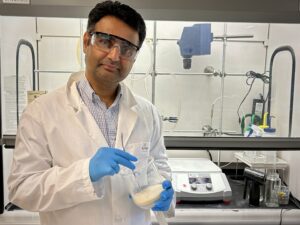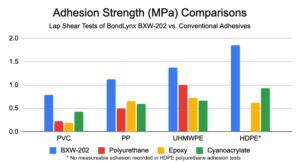
Canadian firm launches PFAS-free molecular adhesive
Canadian Plastics
Canadian Plastics Materials Research & DevelopmentMaterial science company XLYNX Materials has redesigned its BondLynx product to eliminate fluorine.

XLYNX Materials’ senior research chemist Dr. Rashid Nazir. Photo Credit: XLYNX Materials
Victoria, B.C.-based materials science company XLYNX Materials has redesigned its BondLynx molecular adhesive to eliminate fluorine from its chemical structure. The result is an adhesive that is safer for the environment, more stable for storage, and more cost-effective for customers.
First introduced in 2021, BondLynx uses bis-diazirine technology to bond together “unbondable” low-surface-energy plastics like polypropylene (PP) and polyethylene (PE). The product has since found applications as a surface functionalizing agent, an additive in microelectronics fabrication, and a performance textile strengthener.
The problem was that fluorine, which is one of the most reactive elements in the periodic table, was considered a critical component of bis-diazine crosslinking. And fluorine is part of the per-and polyfluoroalkyl substances (PFAS) family of chemicals – a group of chemicals used to make fluoropolymer coatings and products that resist heat, oil, stains, grease, and water. Often called “forever chemicals,” PFAS break down very slowly over time, and exposure to them may be linked to harmful health effects in humans and animals.
So, with the tide turning against the use of PFAS, the development of a suite of fluorine-free products was the company’s top priority. “With all we now know about the persistence of PFAS chemicals in the environment, it was important for us to get ahead of the problem and be a part of the solution,” said XLYNX’s director of strategy Sean Bourquin. “Our clients have been telling us the same thing. This issue is on everyone’s radar these days, so we knew we had to find a new formula for BondLynx.”
To accomplish this goal, XLYNX’s research and development team went back to the drawing board to create a version of BondLynx that didn’t depend on fluorine. “To be honest, we weren’t sure whether a fluorine-free crosslinker with the adhesive strength of the original BondLynx would be possible,” said senior research chemist Dr. Rashid Nazir. “It was uncharted territory.”

Image Credit: XLYNX Materials
Without revealing specifics about the solution the company designed, Nazir reported that test results for the new molecular adhesive have exceeded expectations. In comparative lap shear adhesion tests with conventional polyurethane, cyanoacrylate, and epoxy adhesives, BondLynx BXW-202 outperformed the competition in every category, including:
- 70 to 124 per cent stronger adhesion for PP;
- 84 to 316 per cent stronger adhesion for PVC rubber;
- 100 to more than 200 per cent stronger adhesion for HDPE.
“It’s exciting to see how well it’s performing,” Bourquin said. “To be able to eliminate PFAS chemicals, add stability, and drive down costs, all without compromising the quality of BondLynx adhesion, is a remarkable achievement that we can all be proud of.”
XLYNX says it’s now capitalizing on its innovative platform technology to design a suite of PFAS-free crosslinkers for specific substrates and client applications.
